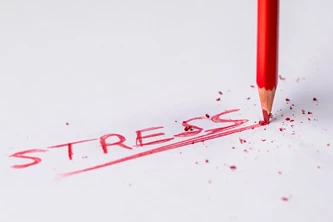 Next stop on our ASWB exam content outline voyage: The indicators of psychosocial stress. You know 'em when you see 'em, if you've been a social worker (or a person) long enough. But let's walk through the basics and then take a look at how the material may look on the licensing exam.
Next stop on our ASWB exam content outline voyage: The indicators of psychosocial stress. You know 'em when you see 'em, if you've been a social worker (or a person) long enough. But let's walk through the basics and then take a look at how the material may look on the licensing exam.
The Indicators
Psychosocial stress can manifest in various ways, and its indicators can be observed across different aspects of an individual's life. Here are some common indicators:
Emotional Indicators
- Anxiety: Feelings of worry, nervousness, or unease.
- Depression: Persistent sadness, lack of interest in activities, and feelings of hopelessness.
- Irritability: Increased frustration or anger.
- Mood swings: Unpredictable changes in mood.
Physical Indicators
- Fatigue: Persistent tiredness or exhaustion.
- Headaches: Frequent tension headaches or migraines.
- Gastrointestinal issues: Stomachaches, nausea, diarrhea, or constipation.
- Muscle tension: Especially in the neck, shoulders, and back.
- Sleep disturbances: Insomnia, restless sleep, or oversleeping.
Behavioral Indicators
- Changes in appetite: Eating too much or too little.
- Substance abuse: Increased use of alcohol, drugs, or other substances.
- Social withdrawal: Avoiding social interactions and activities.
- Procrastination: Delaying tasks and responsibilities.
- Nervous habits: Nail-biting, pacing, or other repetitive behaviors.
Cognitive Indicators
- Difficulty concentrating: Trouble focusing or staying on task.
- Memory problems: Forgetfulness or difficulty recalling information.
- Negative thinking: Pessimism or catastrophic thinking.
- Indecisiveness: Difficulty making decisions.
Psychological Indicators
- Low self-esteem: Feelings of worthlessness or inadequacy.
- Sense of overwhelm: Feeling unable to cope with daily demands.
- Loss of interest: Diminished interest in activities previously enjoyed.
Social Indicators
- Conflict in relationships: Increased arguments or tension with family, friends, or colleagues.
- Isolation: Avoiding social situations and interactions.
- Decreased performance: Decline in work or academic performance.
Recognizing these indicators can help in identifying psychosocial stress early and taking steps to address it, such as seeking support from a mental health professional, practicing stress management techniques, and making lifestyle changes.
Rule Outs
If it walks and talks like stress, it's probably stress. Except for when it's not. Here are some common medical rule-outs:
- Thyroid disorders: Hypothyroidism or hyperthyroidism can cause symptoms like fatigue, anxiety, and mood swings.
- Diabetes: Fluctuations in blood sugar levels can mimic stress symptoms, such as irritability, fatigue, and difficulty concentrating.
- Heart disease: Conditions like arrhythmias or heart attacks can present with anxiety, fatigue, and chest discomfort.
- Chronic illnesses: Diseases such as cancer, multiple sclerosis, or lupus can cause emotional and physical stress-like symptoms.
- Vitamin deficiencies: Deficiencies in vitamins B12, D, or iron can lead to fatigue, irritability, and depression.
- Sleep disorders: Conditions like sleep apnea or insomnia can result in fatigue, irritability, and difficulty concentrating.
- Neurological disorders: Conditions such as epilepsy, migraines, or Parkinson’s disease can cause symptoms that overlap with stress.
Some other possible causes of the above indicators to keep in mind:
- Substance abuse: Alcohol, drugs, or caffeine consumption can cause or exacerbate stress-like symptoms.
- Poor nutrition: Unbalanced diet or irregular eating patterns can lead to fatigue, irritability, and concentration issues.
- Lack of exercise: Physical inactivity can contribute to feelings of fatigue and low mood.
- Poor sleep hygiene: Inconsistent sleep patterns or inadequate sleep can result in fatigue and irritability.
On the Exam
Will this topic show up on the ASWB exam? You never can know for sure. If so, questions may look something like this:
- A 45-year-old client presents with persistent fatigue, frequent headaches, and gastrointestinal issues. Which of the following is the most appropriate next step for a social worker to take?
- During an assessment, a client mentions experiencing gastrointestinal issues and muscle tension. Which additional information should the social worker gather to determine if these symptoms are related to stress?
- A client who has recently lost their job is experiencing social withdrawal and a lack of interest in previously enjoyed activities. These behaviors are best categorized as which type of stress indicator?
You're now a little more ready to pass the ASWB exam (and hopefully a little less stressed out). To get real practice under your belt, sign up for Social Work Test Prep's full-length practice tests.

 Next stop on our ASWB exam content outline voyage: The indicators of psychosocial stress. You know 'em when you see 'em, if you've been a social worker (or a person) long enough. But let's walk through the basics and then take a look at how the material may look on the licensing exam.
Next stop on our ASWB exam content outline voyage: The indicators of psychosocial stress. You know 'em when you see 'em, if you've been a social worker (or a person) long enough. But let's walk through the basics and then take a look at how the material may look on the licensing exam.